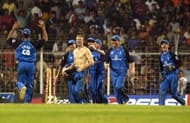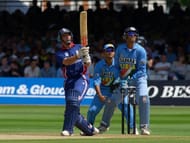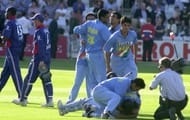His superhuman credentials aside, for Sachin Tendulkar, his name on the honours boards at Lord's is one of those embellishments that the legend could have done with - only to add a feather or two to his cap. The venue hasn't been amongst his favourite hunting grounds. In fact, it hasn't been a hunting ground at all, as his stats of 45 runs from 3 ODIs and 195 runs from 9 Test innings indicate. It is a kind of mismatch, you see. England's most iconic venue - stepping aside from the connotation of it being the 'mecca' of cricket - and one of the most iconic batsmen to have played there hasn't scored many.
The results of those games weren't much different from how Tendulkar fared in them. Of the five Tests that he played at Lord's India lost three (1990, 2002 and 2011), drew one (1996), and escaped defeat by the scruff of their neck in 2007. The team fared much better in ODI cricket. Of the three games Tendulkar played at Lord's, India won two - including the final of the 2002 tri-series. Although Sachin returned to Lord's in 2007, only to lose a one-sided finale, his lasting memory of the venue, at least statistically would have been of that final in 2002.
As it would have been for so many of his teammates - Yuvraj Singh, Mohammad Kaif, and captain Sourav Ganguly - for whom that game was the turning point of their careers. India's tryst with dangers and escapades as well as their heroic comebacks after being counted out, all within the span of 50 overs, made the game what it is remembered as, more than 15 years hence. Tendulkar, in particular, didn't have a good outing even as India were chasing 325. Had they not made it, it would have been a final lost in the humdrum of the overseas defeats that were a norm back then.
That they won it - and how - was a stupendous achievement but what remained hidden beneath the Yuvraj-Kaif heroics and the Ganguly daredevilry from the balcony was the last hurrah that Tendulkar had at the venue. When he was bowled by Ashley Giles, with India needing 180 runs from 26 overs with five wickets remaining, one of the commentators of the host broadcaster was quick to comment that the wicket was the 'death knell' for India in the final.
Little did he know that two young guns would prove him wrong later in the day. The match had big hundreds - from Marcus Trescothick and captain Nasser Hussain - quickfire fifties from Ganguly, Yuvraj and Virender Sehwag and a cameo from Harbhajan Singh at the end of the Indian innings, which, just like Tendulkar's swansong, is easily forgotten.
***
The seeds of what eventually happened at Lord's were sown back home at the Wankhede in Mumbai when England prodigy Andrew Flintoff successfully defended 11 in the final over of the final game of the six-match ODI series to level it 3-3. He then ran around the outfield topless, waving his England tee in an act of jubilation. The shared honours aside, that series was memorable for Ajay Ratra because he was handed his India cap before the first ODI in Kolkata.

"I still remember January 19 (2002) because it was my debut. England were in India for a six-match series. After four games, we were leading 3-1. Thereafter, we lost in Delhi and the final game in Bombay. I still remember we needed six (11) in the final over and Andrew Flintoff didn't let us score them. They leveled the series alright, but when Flintoff removed his t-shirt and celebrated in the middle of the stadium, Dada (Ganguly) was hurt. He was disappointed because we had surrendered the pole position that we had," Ratra remembers.
"Hence, when we won at Lord's while chasing 326, which was in itself a monumental task back then, after being five down for 150-odd with two of your younger batsmen taking the mantle, it was very special. It was a nearly impossible task, which made the moment worth the attention it got. Dada took off his shirt and waved it from the balcony... some might still criticize him for that, but that's the way he was," he adds, emphasizing the importance of the moment.
Much of what transpired after the winning run was scored has been shown on television and elsewhere, but the celebrations didn't end there. Ratra, now coaching Punjab in the Ranji Trophy, recalls Indian fans crowding the lobby of the team hotel and actor Bobby Deol, who was in London at the time, joining the team for dinner after the victory.
"We were put in Hotel Crowne Plaza and Indian fans in the vicinity flocked to the lobby after the victory and didn't leave until midnight. Immediately after the victory, Yuvraj stormed to the ground and literally crashed into Kaif. Kaif fell on his back and his head bumped against the turf... he would have been hurt," Ratra recalls.
***
The win wasn't even remotely as smooth as the celebrations after the game were. There were stories behind the Indian captain's gesture just as there was one behind how his opposite number, Hussain, reacted after getting his maiden ODI ton, that too in a final. During the series, there were calls from former English cricketers, most noticeably Ian Botham - who felt Flintoff should have been batting at 3 for England - that Hussain wasn't batting where he should have been.
While Hussain had done decently in the series leading up to the final - fifty against India in a league game at Lord's - there weren't any big scores barring that. Hence, when he got to his hundred, he thought it fitting enough to turn his back towards the media centre and point to his jersey number - No. 3 - and respond to all those calling him out.

"Hussain was at odds with the English media if I remember correctly. There were opinions that he shouldn't be batting at No. 3 and Michael Vaughan be given that position instead. Hence, when he made that hundred, he turned his back towards the Nursery End and showed his jersey to the media persons sitting there, declaring that he belonged at No. 3. There was a lot of anger buried inside that found an outlet," Ratra recollects.
Hussain himself admitted that he was under pressure. "Don't take it the wrong way, please. It's just that one of two have been permanently on my case and that's what's disappointing. I'm old and ugly enough to take it, but all it's done is continuously labour the point and put pressure on me. I was big enough today to handle that pressure," he said after the match.
His career-best 115 led England to 325/5, a target that was touted to be 'nearly impossible' to chase at innings break. But the Indian camp was upbeat. Ganguly gathered his boys and asked them to go out and play the game without worrying about the target.
"Dada made his message very clear. He asked us to go out and bat normally without looking at the scoreboard. He felt that if we bat normally and get close to the target, then, with batting being our strong point as well... we'll assess our position at the halfway stage," Ratra says.
India were in a peculiar position at the halfway stage. Having leaped to 106 without loss in just over 14 overs, they had lost five wickets for 40 runs in the next 10 overs. At the halfway stage, Ganguly's 43-ball 60 and Sehwag's 49-ball 45 had been neutralized by their wickets as well as those of Tendulkar and Rahul Dravid.
***
"There are times when you are chasing big totals you try to hit everything. We didn't do that. Dada and Sehwag batted aggressively and helped us make full use of the first powerplay. We lost our first wicket on 106 in the 15th over, but that escalated a mini-collapse. Sehwag was caught near the ropes and Mongia (Dinesh Mongia) and Dravid departed in quick succession. Thereafter, Sachin was bowled by Giles. Those wickets gave the advantage to England," Ratra remembers.

"At the drinks break, when Kaif went out to bat at 7, I went to the ground carrying the message from the captain. The message was to occupy the crease and play and to take the game deep. Dada asked them to take the game to the final overs and then assess their plans depending on how many wickets we were left with. I remember telling Yuvraj that although we've lost wickets, our run rate is still healthy and it's still close to run-a-ball."
At 146/5 in 24 overs, India were going at 6.34 runs per over and needed to score at nearly seven runs per over. But since India had the cushion of runs and the momentum of a good start, Yuvraj and Kaif were allowed the luxury of a few overs before going for their shots.
"Yuvraj and Kaif played beautifully. The 121-run partnership turned the game on its head. Thereafter, Harbhajan played a crucial cameo. The best thing for us was that Kaif stayed until the end. Dada's theory of playing seven batsmen was put to test in the game and we came out trumps. There were opinions that a batsman is wasted at 7, but it was a pure batsman at that position who won us the game."
Tendulkar, while all of this was happening, would have been somewhere in that dressing room, watching two boys who were barely out of their teens play the innings of their short careers. He did come out to the balcony after the game and joined Ganguly and the team but that match, in many ways, was won without Tendulkar, despite his presence in the team, something which was a rarity in those days. It was fitting as well because, for all the venues that he had owned around the world, his team had to give him back with the last hurrah at the venue he didn't quite like.
Click here to get India Squad for T20 World Cup 2024. Follow Sportskeeda for the T20 World Cup Schedule, Points Table, and news
